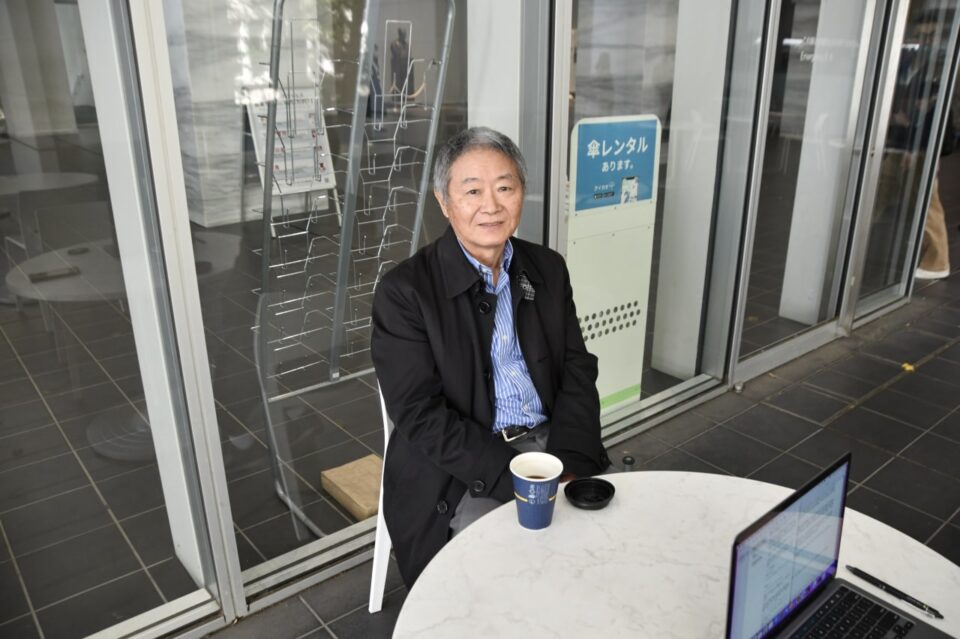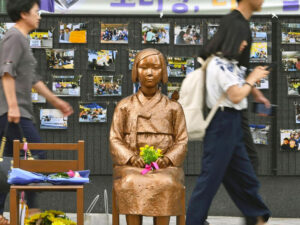
The Ramseyer Papers have sparked outrage in South Korea.
The hottest news that has been making headlines in South Korea for the past two weeks since January 28 is the article by Harvard University Professor John Mark Ramseyer in the International Review of Law and Economics. The hottest news is Harvard professor John Mark Ramseyer’s article on Japanese comfort women, “Contracting for sex in the Pacific War,” published in the International Review of Law and Economics. The Korean press simultaneously reported that “Professor Ramseyer claimed that comfort women were prostitutes,” and Korean society erupted in anger.
The Korean terrestrial MBC TV news reported verbatim, albeit in the form of quotes, the racist accusation by some Koreans that “Professor Ramseyer is a ‘blond Japanese'”. Professor Ramseyer is still being called a “pro-Japanese” and “paid by Mitsubishi, a Japanese war criminal corporation. This was exactly the kind of reporting that fits the phrase, “If you can’t refute the message, kill the messenger.
This is a political tactic in South Korea. If they can’t win an argument, they blame the messenger for his or her private life and thoughts. From there, they question the professionalism of the messenger, leading to questions of fairness and bias. In other words, “The messenger has moral shortcomings and his thinking is biased. Therefore, the claim is wrong”. At any rate, for a while, a cunning situation was staged in which the vortex of “anti-Japanese tribalism” engulfed all news.
I am convinced that the Korean press either did not read the article, or if they did, they did not get the gist of it. Most likely, the former is the case. The early coverage of the article was almost identical. All of the media outlets almost entirely copied the article distributed by the South Korean news agency “United News. However, this is also an extremely common practice in Korea. Perhaps I am foolish to demand that these people “read the paper.
The simple substance of the Ramseyer paper
All academic papers begin with an “abstract” (a summary of the paper’s contents) and three to five keywords. The keywords for this paper are “Prostitution” and “Indentured servitude. The most famous indentured servants in Japanese economic history are the “onnachu” of the Edo period (1603-1868). They were paid large sums of money, usually unseen, to go to their places of employment and work for several years.
Indentured laborers, a famous dimension of world economic history, were laborers who immigrated to the United States from Europe in the 18th and 19th centuries. The cost of passage, including boat fares and food along the way, was a heavy burden for the poor European laborers. Local U.S. employers paid the costs of travel in their stead and put these workers to work, usually for seven years after their arrival in the United States.
Professor Ramseyer identifies contracts between prostitutes who worked in Japanese brothels before the Asian-Pacific War and their owners, and between comfort women who worked in military comfort stations after the war began and their employers, as indentured servitude contracts. Before the prostitutes and comfort women began working, or in other words, before they began their sexual services, the owners offered them a large sum of money in the form of an advance, which the women repaid over the years after they were hired. The women split the amount of money they received from customers, i.e., the sales proceeds, with the employer in a certain percentage, and a portion of their share was used to repay the advance.
As is generally the case with what is called a “good thesis,” Professor Ramseyer’s argument is quite simple. First, “Why did the contract between prostitutes and comfort women take this particular form?” He asks. In the case of ordinary workers, they work first and receive their remuneration in the form of daily, weekly, or monthly wages. Why, however, did prostitutes and comfort women have to sign a unique contract with the employer that stipulated an advance, a contract period of several years, and a percentage of the division of the sales proceeds?
The answer is simple. Women who are offered employment face certain problems. The idea is that engaging in sex work is deeply damaging to a woman’s reputation. Therefore, the contractors offer very favorable terms. The women have to wonder if the contractors will keep their word. What is the solution? The vendor pays a large sum of money in advance. That is an advance.
The vendor also runs into a problem. Due to the nature of the industry, it is impossible to monitor whether the women are working diligently. The nature of the industry makes it impossible to monitor whether the women are working diligently, because the work is done in a closed space. Even if they are treated well, will they work hard? Will the same customers come back and ask for the same woman?
The solution to this problem was to divide the money earned by the women (sales proceeds) in a certain percentage with the employer. Women might not work diligently if they were paid a fixed salary, but they would work hard if their share depended on sales. As a result, the aforementioned special form of contract, a kind of indentured servitude contract, is concluded.
This is the gist of Professor Ramseyer’s paper. It is not Professor Ramseyer himself, but the “issues” and “answers” raised in his paper that should be criticized. All one has to do is say, “You say prostitutes and comfort women signed contracts, but Korean comfort women were taken away by Japanese officials,” and present the evidence. This is evidence of so-called “forced rendition. However, in the 30 years since the comfort women issue was first raised, not a single document has been produced to prove that they were taken by Japanese officials.
Not once does the term “sex slave” appear in the paper.
The only evidence offered by anti-Japanese nationalists in Korea for their “forced rendition” theory is the “testimonies” of former comfort women. Testimonies that they were taken by Japanese soldiers or by the police. However, I do not trust their testimonies. A foreigner in a third-party position, such as Professor Ramseyer, would be unbiased in his grasp of the comfort women issue, and even more so in that aspect.
He is still eager to attack Japan over the comfort women issue and is treated as a Korean national elder (?). Even the testimony of Lee Yong-soo, a former comfort woman who is still eager to attack Japan over the comfort women issue and is treated as a national elder (?) of South Korea, is not a good basis.
Around 1993, when she came out, she said that she saw red shoes and a dress and followed them, but around 2000 she changed her testimony, saying that she was taken by Japanese soldiers. The same is true of all the testimonies of forced marriage that have been put forward by so-called comfort women activists and researchers. Those people and the Korean media, who could no longer criticize the “contract” between the contractors and the comfort women, had no choice but to blame the messenger, Professor Ramseyer.
If you want to criticize the claim (which is not a claim but an objective fact) that the comfort women were given huge advances and made to repay them over several years, all you have to do is to show evidence that they were not given advances. As for the claim that the Korean comfort women were set free and returned to Korea once their advances were repaid in full or their contracts expired, or that they were paid a hefty income by having their sales divided among them, all they need to do is present evidence to the contrary.
But the anti-Japanese tribalists cannot do so. Because there is no evidence. Nor can we find any leaps or errors in Professor Ramseyer’s logical structure. Again, in the end, all they could do was attack the messenger.
The criticism of Professor Ramseyer for “claiming that the comfort women were ‘prostitutes’ and not ‘sex slaves'” misses the point because it fails to grasp the gist of the paper. Moreover, the paper does not mention the word “sex slave” even once.
The paper was not written to prove that the comfort women were prostitutes, but the specifics of the contract between the comfort women and the vendors can be used to argue that the comfort women were not sex slaves. That is what the anti-Japanese tribalists in South Korea wanted to poke at. However, there were no historical and objective facts and documents to criticize, nor could they present such a logical problem.
Why is Korea making a mischievous fuss over the Ramseyer paper?
There is another reason for the mischievous fuss over Professor Ramseyer’s paper. The comfort women “movement” was turned away from the Korean public due to the misconduct of Yoon Mi-hyang, the former head of the Justice Federation and now a member of the National Assembly of the “United Democratic Party of Korea,” but the anti-Japanese nationalists could do nothing about it.
Also, through his book “Anti-Japanese Nationalism,” which has been making waves in Korean society since 2019 and has been translated and widely known in Japan, former Seoul National University professor Yi Yeong-hun has presented new and compelling explanations and materials on the comfort women issue. According to Professor Ri Eong Kaul, comfort women are not “sex slaves. I understand comfort women as “sex workers. However, the opposing side failed to make a serious counterargument this time.
The opposing side needed an excuse to fight back. Then the Sankei Shimbun introduced Professor Ramseyer’s paper, and they seized the opportunity. They attacked the paper and stirred up anti-Japanese public opinion. The Korean public, not fully aware of the situation, even thought that the comfort women issue was a major controversy in the U.S. and Japan as well.
The Japanese media, however, did not make a fuss about the issue. In the U.S., the only sound was the empty cries of Korean student journalists in the Harvard University school newspaper. From the anti-Japanese nationalists’ point of view, the current debacle may have been as successful domestically as before, but externally, it is likely to be recorded as the first instance of a failed attempt to bash Japan over the comfort women issue. (Translation by Eizumi Kinko)









